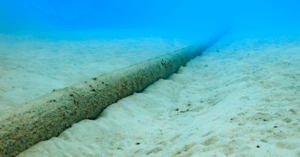
First LNG Carrier Passes Through Bab-el-Mandeb After The Recent Gaza Ceasefire
February 10, 2025
Violette Dorange Becomes Youngest Sailor To Finish Vendée Globe At 23
February 10, 2025

Russia’s state-owned telecom provider, Rostelecom, has reported damage to one of its submarine telecom cables in the Baltic Sea due to an “external impact.”
While the company has not specified the cause or the exact time of the damage, it has confirmed that repair work is underway and that the damage has not disrupted service for users.
On Saturday, Finland’s coast guard stated on X (formerly Twitter) that it was monitoring a Russian vessel conducting repairs on a broken telecom cable in the Gulf of Finland.
However, the Finnish authorities have not disclosed any details about the nature of the damage or when it occurred.
The damage to the cable is the latest among a series of similar incidents in recent months that have affected undersea telecom and power infrastructure in the Baltic region.
In October 2023, separate damage involving a Rostelecom cable coincided with disruptions to subsea infrastructure in Finland and Sweden.
Since Russia’s full-scale invasion of Ukraine in 2022, there have been rising concerns over the security of vital undersea infrastructure in the Baltic Sea.
Western nations suspect that some of the disruptions may be linked to deliberate actions, as these incidents have only increased.
Authorities have frequently attributed these damages to ships dragging their anchors along the seabed. However, there have been fears of intentional sabotage as well.
NATO has denied Russian involvement in previous cases but has increased its security in the region.
In January 2024, NATO launched a new patrol mission called “Baltic Sentry” to protect critical underwater infrastructure. This operation will involve aircraft, drones, frigates and submarines to enhance surveillance and response capabilities.
The Baltic Sea is one of the busiest maritime routes in the world, with thousands of vessels passing through daily.
Since the introduction of Western sanctions on Russian oil, the so-called “shadow fleet” of older, minimally insured tankers transporting Russian crude has raised concerns about security and environmental risks in the region.
A proposal has been made by the Defense Minister of Estonia, Hanno Pevkur, that shipping companies could soon pay taxes to use the Baltic Sea.
Additional measures are being considered by different countries to protect the cables, which may include constructing protective casings or walls around the cables and installing sensors to detect anchors dragging across the sea floor.
References: Reuters, Bloomberg
Source: Maritime Shipping News


